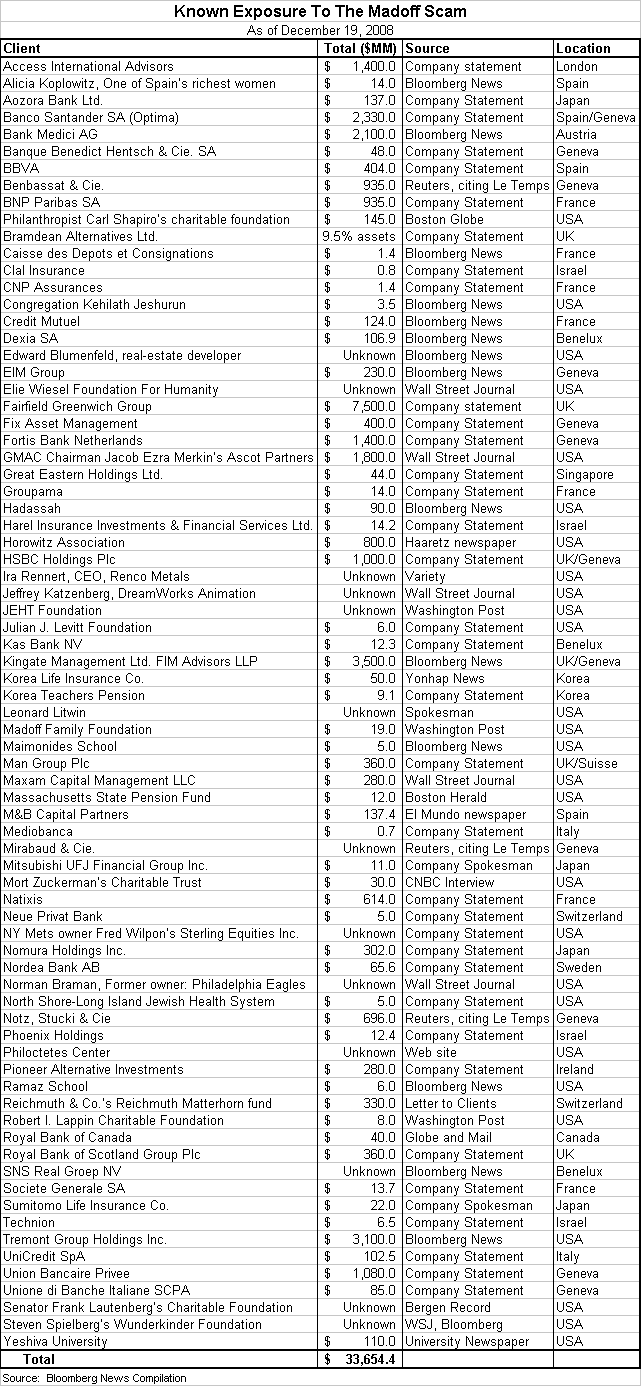-
The Financial Times – Banks lent billions to Madoff ‘feeder funds’
Leading banks from Britain, France and Japan helped investors treble or quadruple bets on Bernard Madoff by lending billions of dollars to “feeder” funds, which placed their money with the alleged fraudster. HSBC, Royal Bank of Scotland, Nomura and BNP Paribas lent the money without spotting a fraud, and in at least one case without due diligence teams visiting Mr Madoff’s brokerage, which held the assets. Banks including Nomura and Spain’s BBVA also helped create special “notes”, structured products that allowed small investors or those barred from investing in offshore vehicles to put as little as $50,000 into Madoff feeder funds. BBVA – which raised €300m ($429m) through these products – offered a guaranteed return of capital, while Nomura provided leverage. Madoff’s alleged $50bn fraud also hit some fully regulated onshore funds accessible to small investors, with shares in feeder funds listed on Irish and Luxembourg stock exchanges. -
The Wall Street Journal – Fairfield Extended Madoff’s Reach
An investment fund with ties to Bernard Madoff is emerging as a central player in helping the financier raise billions of dollars world-wide, extending the reach of an alleged Ponzi scheme. The Securities and Exchange Commission, as part of an investigation into Mr. Madoff’s activities, determined in 2006 that the fund, Fairfield Greenwich Group, hadn’t properly disclosed that Mr. Madoff oversaw its investment decisions, according to an SEC document, though the agency found no evidence of fraud. -
Associated Press – Madoff scandal could lead to tax losses nationwide
Even Uncle Sam may get burned by Bernard Madoff. Investors who lost their fortunes in Madoff’s alleged Ponzi scheme will end up paying far less in taxes and may even be eligible for refunds, according to accounting experts. By some estimates, the Internal Revenue Service could be out as much as $17 billion in lost tax revenue. “This is one more thing federal, state and local officials will have to deal with,” said John Berrie, a tax partner at the law firm Bryan Cave in New York City. “It’s another heavy box on their back.” In addition, investors may be counting on a federally mandated insurance fund to bail them out, but that program lacks the money to pay for all the claims that are likely to come.
Comment At the beginning of the week, the press was unsure of Madoff’s $50 billion figure. At the end of the week, not only is that number possible, it might be low! Below is a list of known exposure to Madoff. It totals $33.6 billion with many firms only acknowledging exposure but not giving an amount.
Two interesting points:
-
It seems that the private Swiss banks are giving a lot more transparency than American charities. Why are the charities so secretive? Are the new secretive institutions American charities?
-
The known exposure out of Geneva Switzerland is over $12 billion. The known exposure out of the United States is $5 billion (with many not disclosing their amount). Press reports seem to focus on Palm Beach and typically show pictures of the Palm Beach Country Club. They have the wrong club. They should be camping out in front of La Société Nautique de Genève (Geneva Yacht Club) as its members may well have a greater exposure to Madoff.
Lastly, we just retuned from London and talked with some bankers from the Middle East. They said exposure to Madoff in the Middle East is “significant”. However, the list below does not include any institutions from that area.

